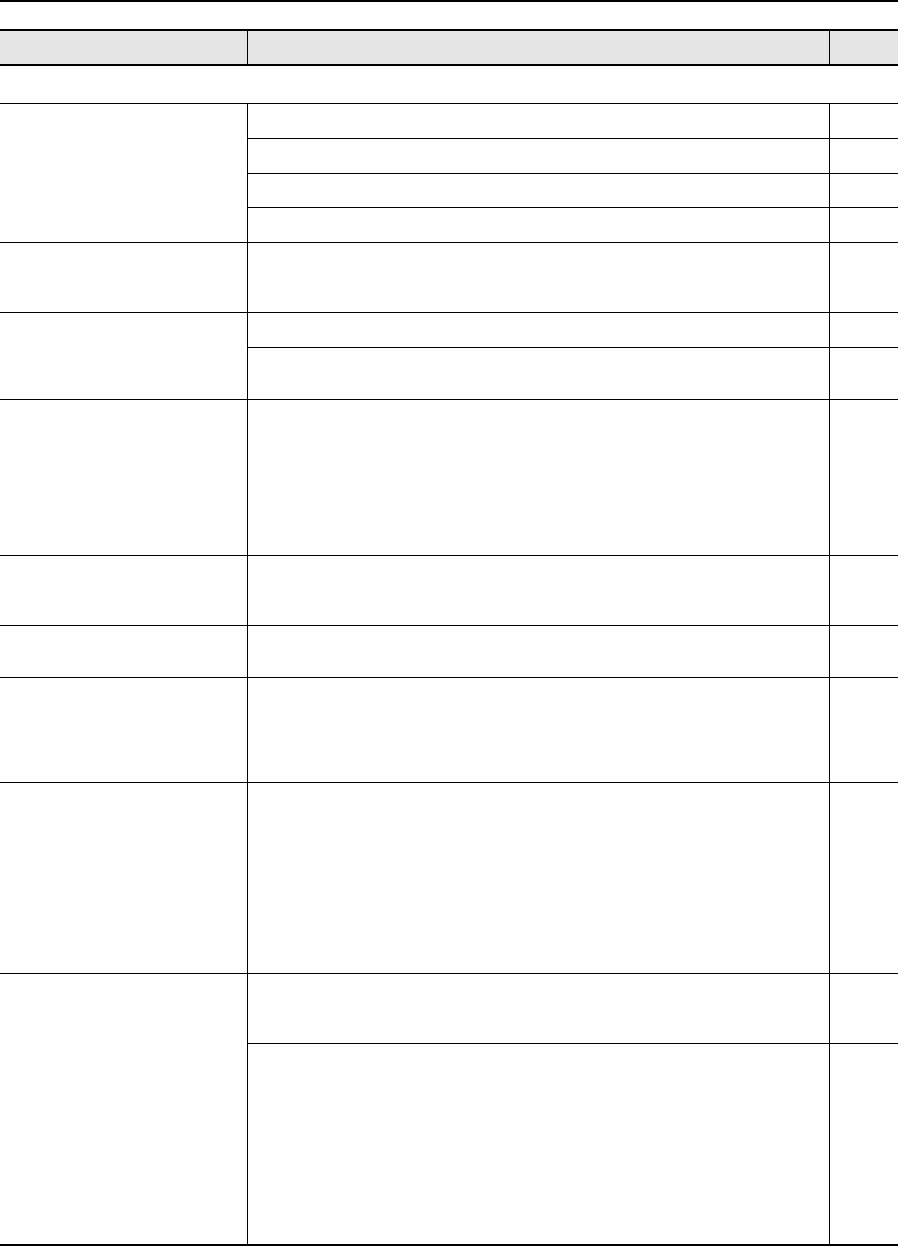
72
Troubleshooting
Notes don’t sound right
Pitch of the keyboard or song is
incorrect
Could you have made Transpose settings? p. 34
Is the Master Tune setting appropriate? p. 55
Is the setting for the Temperament correct? p. 55
Is the settings for the Stretch Tuning correct? p. 55
Not all the notes you play are sounded
The maximum simultaneous polyphony is 128 voices. If you are playing along with a song and
making heavy use of the damper pedal, the number of notes the DP990F is attempting to produce
may exceed the maximum polyphony, meaning that some of the notes will drop out.
—
Sounds are heard twice (doubled)
when the keyboard is played
Is the DP990F in Dual play? p. 28
When the DP990F is connected to an external sequencer, set the Local Control to off. Alternatively,
the sequencer could be set so its Soft Thru feature is Off.
p. 68
The wrong instrument is selected when
you press the [E. Piano], [Strings], or
[Others] button
Tone buttons [E. Piano] [Strings] [Others] also operate as buttons that select “Recommended
Tones.”
With the factory settings, connecting a commercially-available CD-ROM drive to the external
memory connector and selecting a song from a CD-ROM produced for the VIMA (VIMA TUNES) will
automatically cause sounds appropriate for that song to be assigned to the [E. Piano], [Strings],
and [Others] Tone buttons, so that you can select “recommended” sounds by pressing one of these
buttons.
You can also make settings so that “recommended” sounds are not automatically assigned.
p. 70
Effect does not apply
When you are using Dual play or Split play, and different effects are specified for the two selected
tones, the effect will not be applied to Tone 2 (when using Dual play) or the left-hand tone (when
using Split play).
—
Reverberation remains even if You
defeat the Reverb effect
The DP990F’s piano sound faithfully simulates the depth and resonance of an acoustic piano, and
this may give the impression of reverberation even if you’ve defeated the Reverb effect.
—
The sound of the higher notes
suddenly changes from a certain key
On an acoustic piano, the approximately one and a half octaves of notes at the top of the keyboard
will continue sounding regardless of the damper pedal. These notes also have a somewhat
different tonal character. DP990F faithfully simulate this characteristic of acoustic pianos. On the
DP990F, the range that is unaffected by the damper pedal will change according to the key
transpose setting.
—
High-pitched ringing is heard
If you hear this in headphones:
Piano sounds that have a brilliant and crisp character contain substantial high-frequency
components that may sound as though a metallic ringing has been added. This is because the
character of an actual piano is being faithfully reproduced, and is not a malfunction. This ringing is
more obtrusive if the reverb effect is applied heavily, so you may be able to minimize it by
decreasing the reverb.
If you don’t hear this in headphones:
It is likely that there is some other reason (such as resonances within the unit). Please contact your
dealer or a nearby Roland service center.
—
Low notes sound wrong, or are buzzy
If you set the volume to the maximum setting, the sound may be distorted depending on how you
perform.
If this occurs, turn down the volume.
p. 19
If you don’t hear this in headphones:
Performing at high volumes may cause the speakers or objects near the DP990F to resonate.
Fluorescent lights or glass doors may also resonate sympathetically. In particular, this is more likely
to occur for lower notes and higher volumes. You can take the following measures to minimize
resonances.
• Locate the speakers 10–15 cm away from walls or other surfaces.
• Keep the volume down.
• Move away from the objects that are resonating.
If you hear this in headphones:
It is likely that there is some other reason. Please contact your dealer or a nearby Roland service center.
—
Symptom
Cause/Action Page
DP990F_e.book 72 ページ 2010年1月14日 木曜日 午後11時29分


















